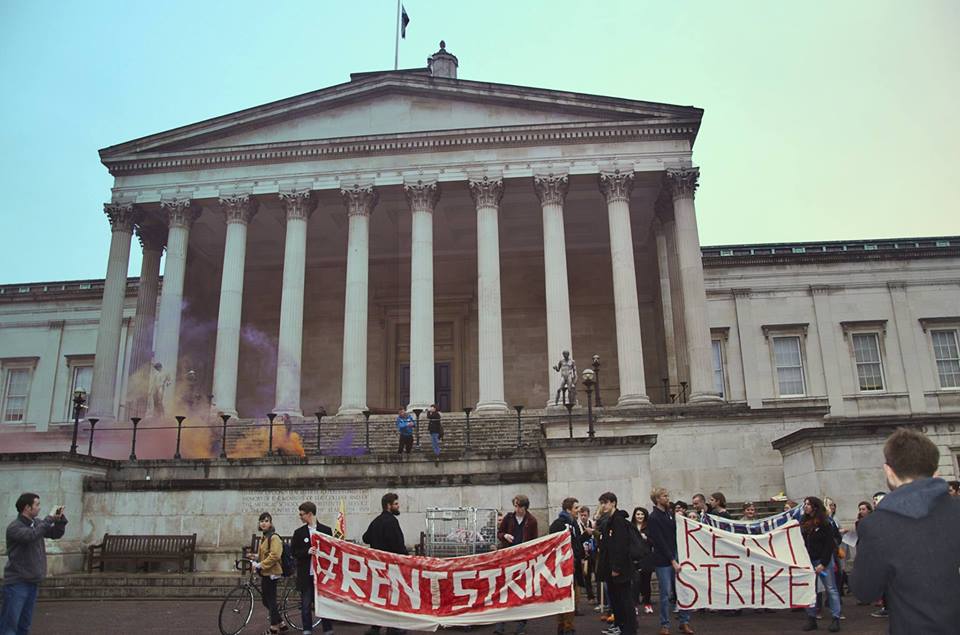UCL Rent Strike: Over £1m Withheld, Victory Underway
by David Dahlborn
3 June 2016

Just as the university landlords reached for the nuclear option, all over London those who have been paying attention are beginning to realise that the rent strikes at University College London (UCL) and Goldsmiths have already triumphed spectacularly.
The strikes have hit a bullseye – the soft underbelly of the big-business university – and their butterfly effect is about to smash the post-2010 higher education funding model. What’s more, we can teach others how to do it, and it may arm the radical left with the most powerful arsenal of civil disobedience tactics available in modern Britain.
On 2 June, Duncan Palmer – head of accommodation at UCL management – fired a desperately rambling letter at everybody withholding rent in student accommodation. In a last-ditch attempt to break the rent strike that is now entering its fourth month, UCL’s management claim rent strikers will be “forwarded to our debt collection agency.” Originally, conservative estimates by campaigners reckoned that 6-700 students are on strike. But Palmer’s letter also states that out of 5000 residents in UCL halls, only around 4000 have paid this terms’ rent. In other words, as many as 1000 people – 20% – are currently on strike, according to the landlords’ statistics. If this is true, then collectively students are withholding well over a £1m. And there isn’t much the university management can do about it.
Since the start of the dispute rent strikers at UCL have maintained it is unfair that the university charges unaffordable rents when 40% of the charge is spent on long-term investment rather than running costs and maintenance. Their solution is to refuse to pay the excess rent. Yes, they initially agreed to a contact. But it turned out the contract was fundamentally exploitative and dishonest, and there is no other option to make rents affordable to those who simply cannot afford it. The key to getting away with it is doing it on a large enough scale.
Crucially, despite their posturing, UCL’s managers know they are powerless to regain any withheld rent without making further concessions to the strikers’ demands or losing vast chunks of their profits. The idea of ‘debt collection’ – a few staggeringly under-resourced, random middle managers in an office trying to harass renters over the phone – is laughable. To seek a county court ruling against hundreds of their own students (who they are meant to care for and educate), in order to physically take their money or assets, would cost more than what strikers currently owe. Not to mention the cataclysmic blow such drawn-out actions would bring down on UCL’s slick PR-image. Other sanctions, such as refusing graduation, are illegal. Checkmate.
This matters to the movement for free education, social housing and social justice because it shows just how vulnerable large institutions in the modern world really are to planned mass disobedience. The UCL estates department, like most other large modern corporations, has huge turnovers but operates on narrow margins. Small disruptions have unpredictably large knock-on effects. Losing £1m would look bad on anybody’s balance sheet. For UCL – whose plan to maximise returns to raise capital for future expansion relies on squeezing every last penny out of every last student and academic – it’s utterly unsustainable. Next year, if managers don’t agree to fair settlement with the UCL Cut the Rent campaign, there will be more strikes and management will lose more money. A financial model dependent on blind compliance has been ridiculed. Because of targeted collective dissent, UCL’s management have no option but to rethink, or keep failing to meet their surplus targets. The rent strike has effectively already won and it shows how other similar actions can win too.
At UCL the situation in halls is not unique, and UCL is not a unique case of exploitation in Cameron’s Britain. Locally, the very same managers who are exploiting students for a rent surplus have also frozen pay for lecturers and imposed harsh restrictions on academics’ departmental endowment funds – a policy that will soon be challenged in an open confrontation and show of strength by the Universities and Colleges Union and the professorial academic board. Meanwhile, nationwide, renters are having the life drained out of them as landlords snatch an increasing share of tenants’ income. These struggles – for fair access to education, for democracy and fair pay for university staff, and for the right to social housing and a living rent – will benefit from spreading the method of coordinated noncompliance practised by student strikers. It will build a movement with real bargaining power.
Since the UCL Cut the Rent campaign began it has scored small victories along the way. The university management paid out hundreds of thousands in compensation, and reduced the cost of accommodation for 5000 students. All that took was a group of rebels with a cause, a photocopier, £1k and a serious strategy to gain power – imagine what we could to with more support from the outside! Now, the unthinkable has become common sense: if we can’t afford to fund a surplus, don’t pay; do it in large numbers to take the fear of violence out of the equation, and the institutions built on credit and endless growth for the sake of growth will panic. We want to help distribute what we have learnt while demonstrating this – if it catches on we will all win.
Victory to the rent strike!
On 18 June UCL Cut the Rent will be holding a manifestation at UCL’s open day.
Photo: Sarah Benamar/UCL Cut the Rent
–
If you want to support media for a different politics, you can donate or subscribe to Novara Media at support.novaramedia.com.